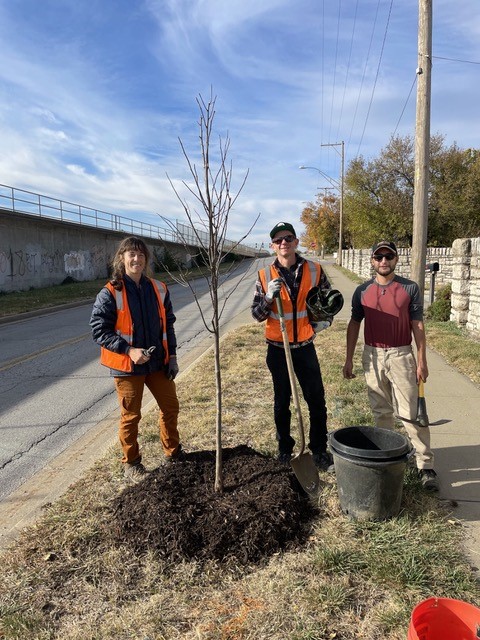Sheffield Cemetery has received a green vanguard of newly planted rosebud trees along a 1,000-foot city right-of-way adjacent to one of the city’s oldest Jewish burial grounds, and it could well be the harbinger of a much broader environmental push.
Three trees were planted last week along 6200 Wilson Avenue, in Kansas City, Missouri, flanking the entryway to Sheffield near the cemetery’s newly refurbished chapel.
The trees were planted to honor the memory of Matilda Rosenberg, Peter Shemitz and Charles Megerman by their families.
Significantly, those plantings could well be just the opening round of tree placements.
The Kansas City City Council in coming months will be considering a Public Improvements Advisory Committee (PIAC) grant request to plant an additional 25 trees along Wilson and Belmont Boulevard, which flanks Sheffield Cemetery on its western side. The grant request was initiated by the family of Matilda Rosenberg.
Members of the community, particularly those living in Kansas City, Missouri, or a history of family living within the city, are urged by the family to contact two city council members representing the Sheffield Cemetery area on the city council to support the grant application — PIAC Request No. 400715, now under active review. The council members are Fourth District Councilman Eric Bunch and District At-Large Councilwoman Katheryn Shields. Both can be reached by mail at City Hall at 414 E. 12th Street, Kansas City, Missouri 64106. Alternatively, emails should be directed to and .
Some congregants of Congregation Beth Israel Abraham Voliner, the Orthodox synagogue that owns the cemetery, remember that decades ago there were trees along Wilson Avenue that disappeared over the years as a result of bad weather and tree decline.
Now, however, with a new generation of families using the cemetery, there is heightened interest in greening the area to help screen nearby industrial complexes and soften the clamor of long freight trains that frequently rumble by.
At the same time, the government of the city of Kansas City is putting heightened emphasis on rapidly expanding new tree planting initiatives to combat climate change and roll back the problem of “heat islanding” in the summer, when poor neighborhoods largely devoid of tree cover experience measurable increases in temperature as the result of the lack of shade.
Forest Decker, director of Kansas City, Missouri, city government’s Neighborhood Services Department, said, “Additional emphasis is being placed on tree planting along several fronts and by multiple departments.”
In response to an email, Decker wrote, “In my Neighborhoods Department, we just awarded $125,000 in ReBuild KC grants for tree planting. We will also be working with Bridging the Gap on execution of those grants. We are also working with the Missouri Department of Conservation on some cost share funding for planting vacant spaces.”
He continued: “As the former City Forester for KC, I assure you I'm looking at every opportunity to plant trees and further that section of our Climate Action Plan.” Decker said that Kansas City city manager Brian Platt “is very supportive of these efforts, and we're lucky to have his help on this…”
Planting trees has become an ingrained Jewish act, particularly with the advent of the Jewish state of Israel. An astronomical 250 million trees have been planted in Israel since 1900.
“It is the only country in the world that ended the 20th century with more trees than it had in 1900,” according to Aardvark Israel, an organization that works to strengthen the bonds between young Jews worldwide and Israel.
The act of tree planting locally is uniquely personal to the three families who just planted three trees at Sheffield Cemetery.
Adam Shemitz said shortly after the passing of his father, “If he knew it was his last day on earth, he would plant a tree.”
Charles Megerman spoke openly with friends about his deferred wish to take up gardening in retirement.
One of Matilda Rosenberg’s most cherished novels was “Overstory,” by Richard Powers, an imaginative exploration of the possible sensibility of trees. She loved caring for the seven trees she and her husband planted around their home, including a linden to remind them of Brooklyn, a Japanese maple evocative of a family adventure in Japan and a ginkgo, which the couple admired on their honeymoon in the Pacific Northwest.
Martin Rosenberg is a Kansas City-based journalist and creator and host of the U.S. Department of Energy podcast, Grid Talk, www.smartgrid.gov/gridtalk.




